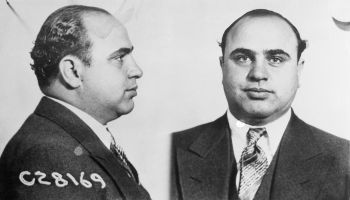VIA THE WASHINGTON POST:
Justice John Paul Stevens, the longest-serving member of the current Supreme Court and the leader of its liberal wing, announced his retirement Friday, giving President Obama his second chance to make a mark on the nation’s highest court.
Stevens, who will turn 90 on April 20, said in a letter addressed to “My dear Mr. President” that he will leave the court at the conclusion of the current term at the end of June.
Stevens said he was announcing his retirement now so that the president would have time to make a nomination — and the Senate could confirm the nominee — before the start of the court’s new term next October.
Stevens was appointed by President Gerald R. Ford and joined the court on Dec. 19, 1975. His retirement is not a surprise, and the White House has been preparing for another opening.
Aides and Democrats close to the process named three people as likely front-runners for the job: Solicitor General Elena Kagan, whom Obama appointed as the first woman to hold the post, and two appellate court judges, Diane P. Wood of Chicago and Merrick B. Garland of Washington.
Kagan and Wood were interviewed by Obama last spring before he nominated Sonia Sotomayor to the court.
Kagan, 49, was confirmed by the Senate as solicitor general in March 2009. She worked as associate White House counsel under President Bill Clinton, was a law professor at the University of Chicago and served as dean of Harvard Law School.
Wood, 59, is a judge on the U.S. Court of Appeals for the Seventh Circuit. Garland, 57, sits on the U.S. Court of Appeals for the District of Columbia Circuit.
A White House official said a representative from the Supreme Court delivered a letter to the White House at 10:30 a.m. from Justice Stevens announcing his intention to retire this summer. White House Counsel Robert Bauer placed a phone call to Obama on Air Force One at 10:45 a.m. to inform him about the letter.
Obama plans to address Stevens’s retirement upon his return to the White House when he delivers previously scheduled remarks on the West Virginia mine tragedy, the official said.
Stevens sent signals last fall that he was thinking of retiring when he declined to hire a full roster of clerks for the term that begins in October. He told The Washington Post last week that he was nearing a decision.
“I can tell you that I love the job, and deciding whether to leave it is a very difficult decision,” he said. “But I want to make it in a way that’s best for the court.”
In his letter dated Friday, Stevens wrote: “Having concluded that it would be in the best interests of the Court to have my successor appointed and confirmed well in advance of the commencement of the Court’s next Term, I shall retire from regular active service as an Associate Justice, under the provisions of 28 D.S.C. § 371(b), effective the next day after the Court rises for the summer recess this year.”
Stevens had made it clear he was not likely to reach the records for both oldest and longest-serving justice — by the end of the term, he will be second in both. He had not said he was specifically retiring to make sure Obama appointed his replacement, but he has repeatedly praised his fellow Chicagoan and noted that Obama formerly taught constitutional law.
He said last week, perhaps tongue-in-cheek, that Obama was probably the most qualified president to make Supreme Court appointments since Ford.
Stevens’s departure will mark a significant shift in the workings of the politically divided court. Obama is certain to nominate someone from the left to replace him, so the ideological balance would not change. The court now has four justices who consistently vote on the left, four on the right, with Justice Anthony M. Kennedy often providing the deciding vote.
In 5-to-4 votes, Kennedy more often votes with conservatives. But, partly because of Stevens’s influence, not always.
In 15 years as the most senior justice on the court’s liberal wing, Stevens has been able to put together a majority leading to groundbreaking decisions in favor of gay rights, restrictions on the death penalty, preservation of abortion rights and the establishment of a role for the judiciary in the nation’s fight against terrorism.
Stevens’s departure also would mark a generational change, the removal of a link not only to the court’s past but also to the country’s.
Stevens was in the stands, as was Franklin D. Roosevelt, when Babe Ruth hit his “called shot” home run in the 1932 World Series. He is the only justice who was around for the start of the Great Depression or who lived through Prohibition. He cracked Japanese code during World War II.
His experiences pop up in opinions. This term brought a reference to World War II propagandist Tokyo Rose, and in the past he has chided his colleagues for being “unduly frightened” by videotape of a high-speed car chase. “Had they learned to drive when most high-speed driving took place on two-lane roads rather than on superhighways,” they would not have been so shocked, he wrote.
“In a broad sense, the court’s decisions help to tell, and record, the nation’s history,” said Gregory G. Garre, who served as solicitor general under President George W. Bush. “There is often an added sense of legitimacy, and even color, when the justices write about the history that they actually lived through. And it’s amazing to think of all the history that Justice Stevens has lived through.”
But speculation quickly turned to whom Obama might name as his replacement.
The White House begins the process with the work done last year. That could mean that Obama would announce his choice in a shorter time than the month he took to choose Sotomayor. Some new names could be considered, White House sources said, because new White House Counsel Robert Bauer was not involved in last year’s search.
But presidents who face successive openings on the court always begin with last year’s list, said David Yalof, a political scientist at the University of Connecticut and author of “Pursuit of Justices: Presidential Politics and the Selection of Supreme Court Nominees.”
“Especially when the president otherwise has a full agenda, they’re going to rely on the research done the previous year, for better or worse,” Yalof said. The media and legal experts concentrate on the runners-up “because that’s what the White House is doing, too.”
Besides Kagan and Wood, the only runner-up Obama interviewed last time was Department of Homeland Security Secretary Janet Napolitano. Garland was on a list of nine potential nominees considered by the White House, but Obama was determined to make a woman his first pick for the court. Sotomayor made history as the court’s first Latina.
Because the choice will not affect the court’s ideological balance, White House officials say — perhaps, wishfully — that they do not expect a protracted battle with Senate Republicans over the nominee. But lifetime appointments to the court are part of a president’s most lasting legacy, and few in the modern era have been controversy-free.
Amid tributes to Stevens, lawmakers and interest groups on opposite sides of the ideological divide immediately began weighing in on the succession, signaling the prospect of a partisan fight over despite calls for comity.
Some conservatives began predicting minutes after the retirement announcement that the opening would give Obama a chance to push a liberal agenda.
“Unfortunately, [Justice Stevens’s] resignation gives President Obama yet another opportunity to carry through on his threat to nominate justices who will indulge their left-wing policy preferences rather than neutrally interpret the law,” said Edward Whelan III, president of the Ethics and Public Policy Center and a former law clerk for Justice Antonin Scalia. “We can’t have any more justices who invent rights that aren’t in the Constitution and ignore rights that are. The American people deserve better. Our Constitution demands better.”
But liberal groups expressed interest in a nominee similar to Stevens. Michael B. Keegan, president of People for the American Way, said Stevens has been a “guardian of the rights and liberties of ordinary Americans” and that he hopes Obama replaces him with a nominee who has the same philosophy and commitment. Keegan noted in particular Stevens’s dissent in a recent Supreme Court ruling, Citizens United v. FEC, which struck down a significant portion of previous law limiting corporate influence in elections.
“In recent years, the Court has given extraordinary preference to powerful interests at the expense of ordinary Americans,” Keegan said. “Justice Stevens was a bulwark against that trend. Our country’s next Justice must play a similar role.”
Senate Majority Leader Harry M. Reid (D-Nev.) said he is “confident that President Obama will use the same wisdom that he showed with his nomination of Justice Sotomayor and name a well-qualified successor.” He urged Republicans “to join us in conducting fair, respectful hearings and swift confirmation of the president’s nominee.”
Sen. Patrick J. Leahy (D-Vt.), chairman of the Senate Judiciary Committee, hailed Stevens’s “extraordinary judicial career spanning four decades, including 35 years on our highest court.” He added: “Justice Stevens’ unique and enduring perspective is irreplaceable; his stalwart adherence to the rule of law is unparalleled. The federal judiciary, and indeed the entire nation, will miss his principled jurisprudence.”
Leahy, whose committee will conduct confirmation hearings for Stevens’s replacement, urged senators of both parties to “make this process a thoughtful and civil discourse” and to “give fair and thorough consideration to Justice Stevens’ successor.”
Sen. Charles E. Schumer (D-N.Y.), a member of the Judiciary Committee, said: “While Justice Stevens’ retirement is not unexpected, the loss of such a great leader at a time of great change for America and the Court is worrisome. . . . At a time when Americans are yearning for bipartisanship, we hope the President will choose a candidate who both merits consensus support and lives up to Justice Stevens’ fine legacy.”
Senate Minority Leader Mitch McConnell (R-Ky.) also praised Stevens’s service while cautioning that Republicans would fight for “judicial restraint” as a main criterion in choosing a successor.
“I commend Justice Stevens for his lifelong commitment to public service, from his early days fighting corruption in Chicago, to his work in naval intelligence during the Second World War, to his more than three decades on the nation’s highest court,” McConnell said in a statement. “Even if Justice Stevens’ liberalism has led to many decisions I oppose, I respect his devotion to the institution and the gentlemanly manner in which he always carried out his work.”
McConnell continued; “As we await the President’s nominee to replace Justice Stevens at the end of his term, Americans can expect Senate Republicans to make a sustained and vigorous case for judicial restraint and the fundamental importance of an even-handed reading of the law.”
Sen. John Cornyn (R-Tex.), a member of the GOP leadership who sits on the Judiciary Committee, said: “Our nation deserves a Supreme Court nominee who is committed to deciding cases impartially based on the law, not on personal politics, preferences, or what’s in the nominee’s ‘heart.’ It is my expectation that senators on both sides of the aisle will work to ensure both a dignified and respectful process for our next nominee.”
Chief Justice John G. Roberts Jr., who was named to the court by President George W. Bush, in 2005, said of Stevens in a statement: “He has enriched the lives of everyone at the Court through his intellect, independence, and warm grace. We have all been blessed to have John as our colleague and his wife Maryan as our friend. We will miss John’s presence in our daily work, but will take joy in his and Maryan’s continued friendship in the years ahead.”
- South Sudan: Entertainment, Food, Languages, Places To Visit + More
- Algeria: Entertainment, Food, Languages, Places To Visit + More
- Morocco: Entertainment, Food, Languages, Places To Visit + More
- Libya: Entertainment, Food, Languages, Places To Visit + More
- Tunisia: Entertainment, Food, Languages, Places To Visit + More














